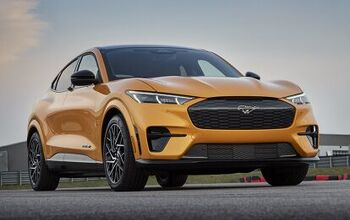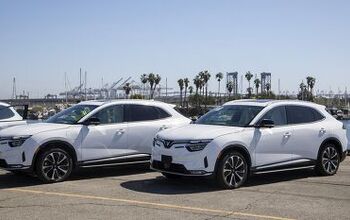Report: Volkswagen Attempts to Create Subsidy Bidding War

Volkswagen is reportedly pausing plans to build a battery plant in Eastern Europe so it can prioritize construction in the United States. Though the situation could be more accurately described as VW notifying EU officials that the U.S. is offering an estimated €10 billion in US incentives as part of the Biden administration’s Inflation Reduction Act (IRA).
It’s not the first time something like this has happened. Volkswagen similarly delayed decisions on where to build a battery plant in December of 2022, telling EU leadership that the Czech Republic, Hungary, Poland, and Slovakia all looked good – but that it wanted to consider its options. This time around, it’s being a little clearer by stating that the U.S. is offering sweeter subsidies and tax incentives than what’s available to Europe.
According to the Financial Times, VW wants to see how the EU will respond to incentives tied to the $369 billion that’s earmarked for green projects in the so-called Inflation Reduction Act.
“Plans in North America have moved forward faster than expected and overtaken decision making in Europe,” an unnamed source told the outlet.
From FT:
The European Commission, which will next week publish a Net Zero Industry Act as part of its response to the US green scheme, is looking to loosen rules on state aid and is reassessing whether to deploy EU-level subsidies. But an early draft outlined last week has fallen short, according to industry executives.
A senior executive at another European battery maker present at last week’s meeting, which took place in Brussels and that competition commissioner Margrethe Vestager attended, said: “It looks pretty bad. There was an absence of concrete measures.”
Another executive said: “We’ve been contacted by many US states and they all highlight the IRA. When we put the figures together, the conditions they offer are much more interesting than the conditions they offer in Europe.”
The European Commission said on Wednesday that it did not comment on individual decisions taken by companies.
While Volkswagen hasn’t made any final decisions regarding the location of its North American or European battery plants, it has confirmed that it will indeed build more facilities. “But for this we need the right framework conditions. That is why we wait and see what the so-called EU Green Deal will bring,” the company explained.
The automaker believes it’s making much faster progress in the United States, which feels like a roundabout way to say it’s offering more money to build there. Arno Antlitz, VW’s chief financial officer, has clarified by stating that Volkswagen always had plans to build battery factories in North America. But that new subsidies accelerated plans and made the U.S. plant a priority.
“The IRA gives us a tailwind in terms of speed and consequence, so we have the possibility to enlarge our global footprint even faster in the US with the IRA,” said the CFO.
With China and South Korea dominating global battery production, Western nations appear terrified that they’re about to see the automotive sector wither and die without localized battery production. The Biden administration has even claimed the matter is a national security issue, echoing similar calls made by the Trump administration to bring manufacturing back into the United States.
Last week, Volkswagen Group met with senior EU officials as part of the European Battery Alliance. Reports have the event attended by consequential EU commissioners like Thierry Breton, Margrethe Vestager, and Maroš Šefčovič – who were told by chemical company Umicore and the battery producer Northvolt that Europe needs to speed up its permitting process and respond to the IRA.
This week, Lobbying group Transport & Environment issued a warning that two-thirds of the planned European battery projects could be canceled, stalled, or scaled back without more help from the government. They, like VW, would also like to see the European Union moderate pricing on “green energy” so that it can be made lower than electricity sourced from fossil fuels.
We all know what this means; the industry wants more money from the tax base and special treatment. Volkswagen would like the EU to sweeten the terms of any prospective deals, similar to what it’s been doing ( with help from the German government) to help stall voting on combustion vehicle bans. In the meantime, it doesn’t appear to be above ransoming (or appearing to ransom) a battery factory or two. But that’s business and is effectively how the automotive industry has operated throughout living memory.
Volkswagen has plans to build six European battery factories offering 40GWh of capacity apiece. The first of these are to be located in Salzgitter, Germany, and Valencia, Spain, with production commencing in 2025.
“We are still evaluating suitable locations for our next cell factories in eastern Europe and North America. No decisions have been made yet. We stick to our plan to build cell factories for about 240 GWh in Europe by 2030 but for this, we need the right framework conditions. That is why we wait and see what the so-called EU green deal will bring,” Volkswagen stated.
Meanwhile, the regulatory environment in the EU has gotten a little hectic. The long-awaited combustion ban plan has hit a major snag and surveys continue to note how consumer battery acceptance has started to decline within the continent and workers' unions are pushing back against unfettered electrification over prospective layoffs. Building a factory in Eastern Europe has also become less appetizing than it would have been before the start of the Russo-Ukrainian War. Our guess is that VW had more than one reason to hold off on any upcoming battery plants. Though they still all equate to long-term financial concerns.
[Image: Vytautas Kielaitis/Shutterstock]
Become a TTAC insider. Get the latest news, features, TTAC takes, and everything else that gets to the truth about cars first by subscribing to our newsletter.

A staunch consumer advocate tracking industry trends and regulation. Before joining TTAC, Matt spent a decade working for marketing and research firms based in NYC. Clients included several of the world’s largest automakers, global tire brands, and aftermarket part suppliers. Dissatisfied with the corporate world and resentful of having to wear suits everyday, he pivoted to writing about cars. Since then, that man has become an ardent supporter of the right-to-repair movement, been interviewed on the auto industry by national radio broadcasts, driven more rental cars than anyone ever should, participated in amateur rallying events, and received the requisite minimum training as sanctioned by the SCCA. Handy with a wrench, Matt grew up surrounded by Detroit auto workers and managed to get a pizza delivery job before he was legally eligible. He later found himself driving box trucks through Manhattan, guaranteeing future sympathy for actual truckers. He continues to conduct research pertaining to the automotive sector as an independent contractor and has since moved back to his native Michigan, closer to where the cars are born. A contrarian, Matt claims to prefer understeer — stating that front and all-wheel drive vehicles cater best to his driving style.
More by Matt Posky
Latest Car Reviews
Read moreLatest Product Reviews
Read moreRecent Comments
- Scrotie about 4 years ago there was a 1992 oldsmobile toronado which was a travtech-avis pilot car that had the prototype nav system and had a big antenna on the back. it sold quick and id never seen another ever again. i think they wanted like 13500 for it which was steep for an early 90s gm car.
- SunnyGL I helped my friend buy one of these when they came in 2013 (I think). We tried a BMW 535xi, an Audi A6 and then this. He was very swayed by the GS350 and it helped a lot that Lexus knocked about $8k off the MSRP. I guess they wanted to get some out there. He has about 90k on it now and it's been very reliable, but some chump rear-ended it hard when it was only a few years old.From memory, liked the way the Bimmer drove and couldn't fathom why everyone thought Audi interiors were so great at that time - the tester we had was a sea of black.The GS350's mpg is impressive, much better than the '05 G35x I had which could only get about 24mpg highway.
- Theflyersfan Keep the car. It's reliable, hasn't nickeled and dimed you to death, and it looks like you're a homeowner so something with a back seat and a trunk is really helpful! As I've discovered becoming a homeowner with a car with no back seat and a trunk the size of a large cooler, even simple Target or Ikea runs get complicated if you don't ride up with a friend with a larger car. And I wonder if the old VW has now been left in Price Hill with the keys in the ignition and a "Please take me" sign taped to the windshield? The problems it had weren't going to improve with time.
- SPPPP I don't think it's a sign of pressure from external competition, but rather a healthy sign of letting practicality trump triumphalism on the assembly floor. Does a 1-piece casting make sense? Imagine the huge investment (no pun intended) in the tooling for that structure. Now imagine that a change in regulation or market conditions requires a change to the structure. You're going to build all the tooling all over again? Why not use "gigacasting" selectively, to build right-sized modules that can be assembled simply and repeatably? Changing 1/3 of the tooling is much less costly. Additionally, it makes the vehicles repairable, instead of being subject to total loss in a minor accident.
- Formula m Oh my first Ford learning experience was with a sales manager who is a former stripclub manager with a Satan’s choice tattoo on his forearm… was very eye opening. You can imagine how he has contributed to Ottawa over his long tenure with Ford. Hopefully A.I. gives a different experience


































Comments
Join the conversation
@Freedmike So...if the Chinese company is Foxconn, it gets the "whatever-passes-as-conservative-these-days" seal of approval from Donald Trump and Scott Walker, but not in the case of this Chinese company. Fascinating.
Foxconn is a Taiwanese Company, not Chinese.....Yes they do have manufacturing in China but they are owned and operated in Taiwan.....A friendly country to the US
Angela Merkel has built the 4th Reich. Germany bought entire industries all over Eastern Europe. To expand German production base they brought-in millions of migrants. But the migrants they brought did not assimilate and don't have the desire to work in the production lines. It was in 2015 and in 2023 the future "workers" not materialized. Germany started to look into Eastern Europe. Germany and EU as whole started to become a serious economic threat to US. But they had a weak link - energy source. This is why US blew the pipeline and now German companies will be working for US. While Germans can lick the paw.